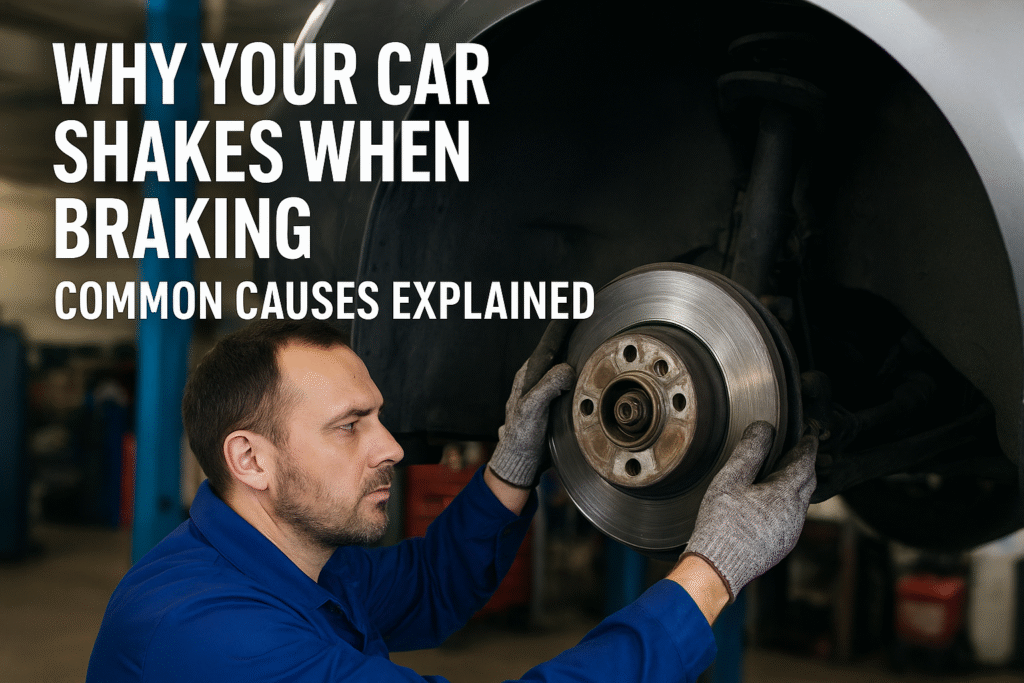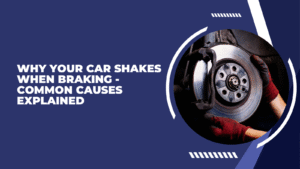If you’ve ever felt your steering wheel or brake pedal shake when pressing the brakes, you’re not alone. It’s one of the most common issues drivers experience, and one we’ve diagnosed countless times at our Advanced Automotive locations in Gainesville and Warrenton, VA.
For over 35 years, our technicians have been helping drivers solve brake vibration problems. While there are several possible causes, one thing is certain – your car is sending a clear signal that something isn’t right. Understanding what causes these vibrations can help you fix the issue early, improve your safety, and avoid costly repairs later.
What It Means When Your Car Shakes While Braking
When you feel shaking or vibration while braking, it usually points to uneven friction between your wheels and the braking system; essentially, the car is warning you that something is out of balance.
The vibration can appear in different ways:
- Steering wheel vibration – Often caused by issues in the front brakes or suspension.
- Brake pedal pulsation – Typically linked to warped brake rotors.
- Entire vehicle shake – May result from tire balance, suspension, or general brake wear.
Ignoring these signs can lead to longer stopping distances, steering instability, and uneven tire wear — all of which compromise your safety and driving comfort.

1. Warped Brake Rotors
Among all the causes of brake vibration, warped brake rotors are the most common. Brake rotors are metal discs that your brake pads press against to slow your car. Over time, heat and friction can cause these rotors to warp or develop uneven surfaces.
When this happens, your brake pads make inconsistent contact with the rotors, creating that pulsing or shaking feeling through your steering wheel or brake pedal.
If the vibration occurs mainly while slowing down from highway speeds (around 50–70 mph), it’s likely that your front rotors are the problem. The good news? A professional rotor resurfacing or replacement usually restores smooth braking.
2. Worn or Glazed Brake Pads
Brake pads naturally wear out with use – that’s a normal part of driving. However, when they wear unevenly or become glazed (hardened due to excessive heat), their ability to grip the rotor effectively decreases. This not only causes vibration but can also produce squeaking or grinding noises.
Glazed pads often result from frequent hard braking or driving in heavy traffic, where brakes are used constantly. If left unchecked, worn or glazed pads can damage your rotors and increase repair costs.
At Advanced Automotive, every brake inspection includes checking both the pad thickness and the rotor condition. Replacing worn pads in time ensures better stopping power and prevents rotor warping.
3. Suspension or Steering Issues
Sometimes, shaking during braking has less to do with the brakes themselves and more with the suspension or steering components. Your car’s suspension system is designed to keep it stable and balanced – especially when braking or turning.
Worn ball joints, loose tie rods, or damaged control arm bushings can cause wheel misalignment or excessive movement. When you press the brakes, the suspension struggles to keep the car steady, resulting in noticeable vibration.
These issues often become more prominent when braking downhill or at higher speeds. During our inspections, we always check suspension and steering alignment along with the braking system. Often, the vibration comes from a combination of both systems not working together properly.
4. Tire or Wheel Imbalance
Not all brake-related vibrations originate from the braking system. Sometimes, a tire or wheel imbalance can mimic the same symptoms. An unbalanced wheel or uneven tire tread can cause shaking that feels worse when braking or decelerating.
You might also notice vibration while driving at constant speeds. This issue can develop if you recently replaced your tires, had a wheel alignment, or accidentally hit a curb or pothole.
Regular tire rotation and balancing – ideally every 6,000 to 8,000 miles – helps prevent uneven wear and reduces the chance of steering vibration. Proper wheel balance not only ensures a smoother ride but also extends the lifespan of your tires and suspension components.
5. Sticking Brake Caliper
Your brake calipers are responsible for pressing the pads against the rotors when you brake. If one of these calipers sticks or seizes, it can cause uneven braking pressure on one side of the vehicle.
A stuck caliper often leads to vibration that intensifies as you drive. You might even notice your car pulling slightly to one side or smell a burning odor after a trip – both signs that one brake is working harder than the others.
Ignoring a sticking caliper can cause serious rotor damage and reduce braking efficiency. A proper brake inspection can determine whether the caliper needs to be cleaned, rebuilt, or replaced.
How We Diagnose Brake Vibration at Advanced Automotive
At Advanced Automotive, our ASE-certified technicians use a systematic approach to pinpoint the cause of any braking vibration. Here’s how we ensure an accurate diagnosis:
- Road Test – We drive your vehicle at various speeds to identify when and where the vibration occurs.
- Visual Inspection – Our team examines brake pads, rotors, and tires for wear or damage.
- Precision Measurement – Using specialized tools, we measure rotor thickness and run-out to detect any warping.
- Suspension Check – We test components like tie rods, ball joints, and bushings for looseness or wear.
- Computer Diagnostic – For modern vehicles, we use advanced diagnostic tools to assess ABS and electronic brake systems.
Once the source of the problem is identified, we’ll explain exactly what’s happening — clearly, honestly, and without unnecessary upselling.
Why Fixing Brake Vibration Matters
Brake vibration isn’t just an annoyance – it’s a safety concern. Ignoring it can lead to premature wear on your brake pads, rotors, suspension components, and even wheel bearings. Over time, these issues can escalate into more expensive repairs.
More importantly, an unstable braking system can increase your stopping distance, especially during emergency braking. Maintaining a smooth and balanced braking system ensures not only your comfort but also your safety and that of everyone on the road.
Your brakes are the most crucial safety system in your vehicle. When they start sending warning signs like vibration, noise, or reduced performance, it’s best to get them checked right away.
Your Local Brake Experts in Gainesville & Warrenton
At Advanced Automotive, we’ve proudly served the Gainesville and Warrenton communities for over three decades. As a family-owned and operated auto repair shop, we treat every vehicle as if it were our own.
Whether your steering wheel or brake pedal shakes when braking, or you simply want peace of mind before your next road trip, our team can help. We’ll diagnose the issue, explain the cause, and get you back on the road safely – often the same day.
Visit our Gainesville or Warrenton location, or contact us online today to schedule your brake inspection. Let our experts restore your car’s smooth braking and keep you driving confidently.

 Oil Change Gainesville
Oil Change Gainesville  Auto Brake Repair Gainesville, VA
Auto Brake Repair Gainesville, VA  Fleet Services Gainesville
Fleet Services Gainesville